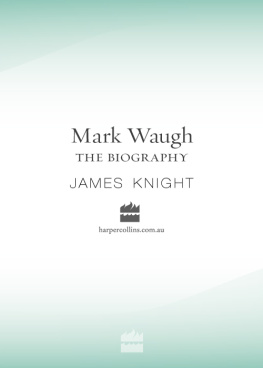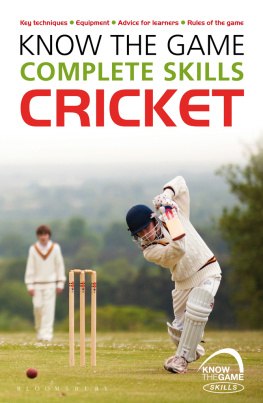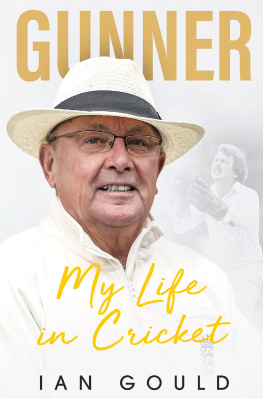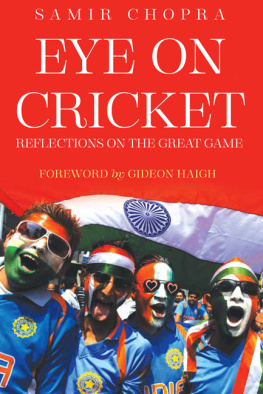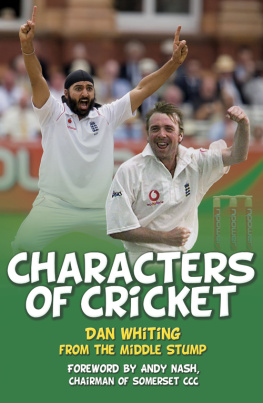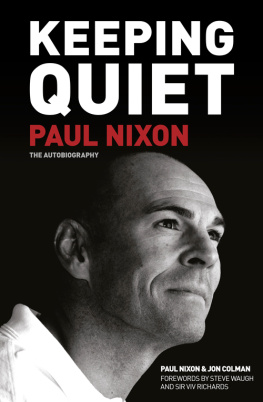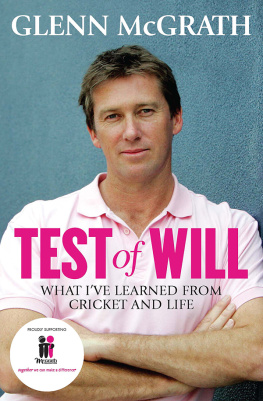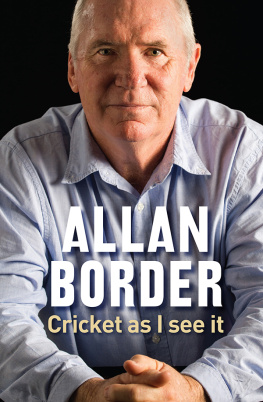<
PENGUIN BOOKS
Out of My Comfort Zone
As captain of the Australian Test team from 1999 to 2004, Steve Waugh turned a successful side into a dominant force that in many cricket watchers view ranks with Sir Donald Bradman's 1948 Invincibles and the West Indian teams of the 1980s as one of the best teams of all time.
Waugh is also noted for having departed from the sometimes ockerish traditions of Australian cricket, encouraging his players to learn about the cultures of the countries they played in, and helping raise funds for Indian children affected by leprosy.
In the 200203 Australian season Waugh made one of cricket's most memorable hundreds, played out in front of an adoring crowd at the Sydney Cricket Ground. Twelve months later he ended his career on his own terms, a universally respected figure who timed his farewell just right, and left the stage to a standing ovation from every fan across the cricket world.
STEVE WAUGH
Out of My Comfort Zone
the autobiography
PENGUIN BOOKS
PENGUIN BOOKS
Published by the Penguin Group
Penguin Group (Australia)
250 Camberwell Road, Camberwell, Victoria 3124, Australia
(a division of Pearson Australia Group Pty Ltd)
Penguin Group (USA) Inc.
375 Hudson Street, New York, New York 10014, USA
Penguin Group (Canada)
90 Eglinton Avenue East, Suite 700, Toronto, ON M4P 2Y3, Canada
(a division of Pearson Penguin Canada Inc.)
Penguin Books Ltd
80 Strand, London WC2R 0RL, England
Penguin Ireland
25 St Stephen's Green, Dublin 2, Ireland
(a division of Penguin Books Ltd)
Penguin Books India Pvt Ltd
11 Community Centre, Panchsheel Park, New Delhi 110 017, India
Penguin Group (NZ)
Cnr Airborne and Rosedale Roads, Albany, Auckland, New Zealand
(a division of Pearson New Zealand Ltd)
Penguin Books (South Africa) (Pty) Ltd
24 Sturdee Avenue, Rosebank, Johannesburg 2196, South Africa
Penguin Books Ltd
Registered Offices: 80 Strand, London WC2R 0RL, England
First published by Penguin Group (Australia), 2005
This edition published by Penguin Group (Australia), 2006
Copyright Stephen Waugh 2006
The moral right of the author has been asserted.
All rights reserved. Without limiting the rights under copyright reserved above, no part of this publication may be reproduced, stored in or introduced into a retrieval system, or transmitted, in any form or by any means (electronic, mechanical, photocopying, recording or otherwise), without the prior written permission of both the copyright owner and the above publisher of this book.
ISBN: 9780857968135
www.penguin.com.au
For my lifelong friend and partner, Lynette, who has endured and shared the best and worst times with me, whose nurturing ways, wisdom and unconditional love have comforted and inspired me.
And for our children, Rosalie, Austin and Lillianyou are life's most precious and greatest gifts. Your love of life, unique character and spirit make each and every day an adventure.
Of all my achievements, nothing matches the feeling of returning home to my family and the sight of you guys running up the hallway, trying to be the first to jump into my arms.
Contents
FOREWORD BY RAHUL DRAVID
I was 14 years oldsweating at the nets and dreaming, like schoolboys do, of playing for my countrywhen I first saw Steve Waugh. It was the 1987 World Cup in India, which Australia won, and while Steve was in his early twenties he had already caught my eye. This was not merely because of his ability with bat and ball (his slower deliveries bowled with various actions would soon be replicated in nets around India), but also for his grit under pressure. Steve appeared to relish the big occasion, seemed to thrive in such situations, but I had no idea back then that it would be this characteristic that would become his signature or that years later I would be privileged to see it first hand.
Greatness is a label easily bestowed in these exaggerated times, but Steve earned such high praise. History will remember him as one of the game's finest practitioners. He averaged over 50 in Test cricket, the mark of a superb batsman, and played a significant role in two World Cup victories, 12 years apart. As captain, he inherited a gifted Australian team from Mark Taylor and forged it into an even more aggressive and successful side. He was influential beyond his shores, a man looked up to.
Steve was a hard man and respected because he had done it the hard way. Greatness was not handed to him; he pursued it diligently, single-mindedly. Dropped from the team, he worked his way back. The story of his resolute journey, among other things, makes for interesting reading.
With 32 Test centuries, there is no shortage of impressive innings to remember, but the one that stands out for me is the 67 not out in 273 minutes he made against us in a one-off Test in Delhi in 1996. On a turning wicket, alive with uneven bounce, he constructed an innings that was masterful in both its technique and its complete concentration. Watching it from silly point as he fended off gifted spinners like Anil Kumble was an education, a lesson for a youngster like me playing in his first season of international cricket.
For me, when Steve batted, a couple of things stood out. There was the infinite care he put into his defence, each ball carefully watched and played as if his life depended on it. The acceleration of his bat was interesting as well, for sometimes you thought he was going to be late for the ball, but then his bat would descend at tremendous speed to meet it. Most of the time we left him alone, not speaking to him on the field, for we knew he fed off any conversation, and enjoyed confrontation and the challenge that came with it. Australia was never beaten while he was there at the crease.
On the field, his manner was introverted, his emotions tightly locked. He appeared to live the clich of No quarter given and none asked. But off the field, if you sought him out for a chat, he was never reluctant to share his thoughts.
On Australia's 1998 tour to India I was keen to pick his brain on batting and cricket in general, and Steve promised to let me do so once the series was over. But Australia lost the series and he was injured and missed the last Test, in Bangalore. I would have understood if he had forgotten about this eager youngster, and I thought it was inappropriate to remind him, but on the third day of the Test, unprompted, he called me and we met for dinner. It was a discussion that would have a lasting influence on me.
His ruthless style, combined with a passion for the game, has won him a staggering, almost unrivalled, following in India. But this is a reverence that does not stem only from cricket but also from a generosity of spirit. Steve's work with the children of Udayan in Calcutta has been widely admired, and he has also sought to discover India, to learn about us and go beyond the tired, stereotypical image of this beautiful country that so many visiting cricketers carry with them.
Steve's legacy is hard to define, but I will remember him because he gave grit a good name. He proved that it is not only the pretty player who can capture the imagination, but also the tough and determined. Suddenly these qualities became as vital, as spoken about, as silken grace and sublime timing. He was leathery tough, played the game aggressively, and would do whatever it took within the rules to win. He built a team that has achieved legendary status, raised the level of young cricketers who played under him, and also embraced the traditions of the game and highlighted their importance.


